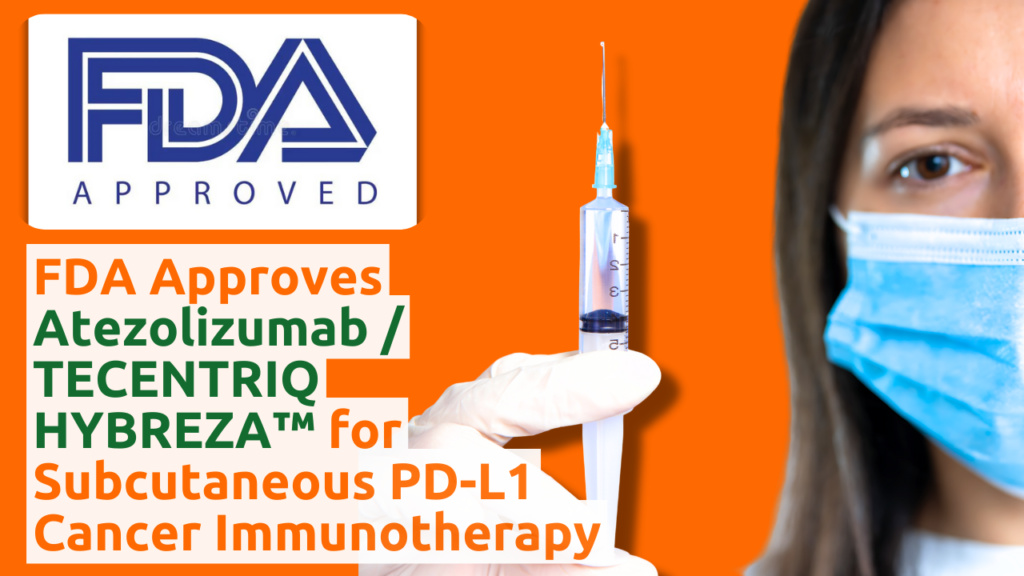On September 12, 2024, the U.S. Food and Drug Administration (FDA) approved Tecentriq Hybreza, the first subcutaneous (SC) formulation of a PD-(L)1 inhibitor for cancer treatment. Developed by Genentech, Tecentriq Hybreza (atezolizumab and hyaluronidase-tqjs) allows for a 7-minute subcutaneous injection, significantly reducing the 30 to 60 minutes typically required for intravenous (IV) administration of Tecentriq. This new formulation provides an alternative treatment option for patients with cancers such as non-small cell lung cancer (NSCLC), small cell lung cancer (SCLC), hepatocellular carcinoma (HCC), and others.
New Administration Option for Cancer Patients
Tecentriq Hybreza is expected to offer patients and healthcare providers greater flexibility by allowing faster treatment times and the ability to administer therapy in more accessible settings. Levi Garraway, M.D., Ph.D., Chief Medical Officer at Genentech, highlighted the practical advantages, noting that the subcutaneous formulation maintains the efficacy and safety profile of the IV formulation while providing a faster and potentially more comfortable option.
Tecentriq Hybreza will be available for all current IV indications of Tecentriq, including various types of lung, liver, and soft tissue cancers.
Clinical Data Supporting Approval
The FDA’s approval is based on results from the Phase IB/III IMscin001 study, which compared Tecentriq Hybreza to the IV formulation. The study involved 371 patients with advanced or metastatic NSCLC who had failed prior platinum-based therapies. Key findings demonstrated that the pharmacokinetics—levels of the drug in the blood—of Tecentriq Hybreza were comparable to those of the IV formulation. The study also found that the efficacy outcomes, including overall response rate, progression-free survival, and overall survival, were consistent between the subcutaneous and IV administration methods.
In addition, the Phase II IMscin002 study evaluated patient preferences between the SC and IV formulations of Tecentriq in 179 patients with various forms of NSCLC. The study found that 71% of patients preferred the subcutaneous formulation due to reduced treatment time and increased comfort, while 79% of patients chose to continue treatment with Tecentriq Hybreza after experiencing both options.
Patient-Centered Treatment Options
The subcutaneous administration method offers patients a more time-efficient treatment option without compromising safety or efficacy. Ann Fish-Steagall, RN, Senior Vice President of Patient Services at LUNGevity Foundation, pointed out the importance of having treatment options, noting that patients feel more empowered when they have a choice in their care.
Tecentriq Hybreza’s faster administration time could also lead to more streamlined clinic operations, with reduced time demands for both patients and healthcare providers.
Global Approval and Access
Tecentriq Hybreza received its first worldwide approval in Great Britain in August 2023 and is now approved in over 50 countries. Genentech has indicated that ongoing regulatory reviews are taking place in additional regions to expand access to this treatment.
The FDA approval aligns Tecentriq Hybreza’s indications with those of IV Tecentriq, offering a new administration route for patients with difficult-to-treat cancers, such as:
- Non-small cell lung cancer (NSCLC)
- Small cell lung cancer (SCLC)
- Hepatocellular carcinoma (HCC)
- Alveolar soft part sarcoma (ASPS)
- Certain types of metastatic urothelial cancer (mUC)
- PD-L1-positive metastatic triple-negative breast cancer (TNBC)
- BRAF V600 mutation-positive advanced melanoma
Conclusion
Tecentriq Hybreza introduces a new, faster treatment method for cancer immunotherapy, providing a comparable alternative to the IV formulation of Tecentriq. While maintaining the same clinical benefits, this subcutaneous option offers greater flexibility and convenience for both patients and healthcare providers.
The availability of a subcutaneous cancer immunotherapy reflects ongoing efforts to improve patient experiences in cancer care, particularly for those undergoing long-term treatment regimens. As more countries review Tecentriq Hybreza for approval, this option may become available to a wider global population.
External Resources:
FDA Approves Genentech’s Tecentriq Hybreza, the First and Only Subcutaneous Anti-PD-(L)1 Cancer Immunotherapy: https://www.gene.com/media/press-releases/15035/2024-09-12/fda-approves-genentechs-tecentriq-hybrez
OncologyTube Related Posts:

